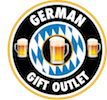
At Oktoberfest in Munich there are rules. Mostly, they relate to beer. And by mostly, we mean all of them. And by all of them, we mean all 2:
1. Each beer served at Oktoberfest in Munich must go by the Reinheitsgebot, meaning each beer has a minimum of 13.5% Stammwürze (which translates to approximately 6% alcohol) and must be "pure" - containing only water, barley, hops, yeast, wheat malt and/or cane sugar.
2. All beer at the festival must be brewed within the city limits of Munich.
The "Big Six" breweries that produce Oktoberfest Beer under the criteria are:
- Augustiner
- Hacker-Pschor
- Löwenbräu
- Paulaner
- Spaten
- Hofbräuhaus
Augustiner
The Brewery: The Augustiner brothers began brewing beer in 1328 which makes Augustiner one of the Munich's oldest surviving breweries. Anton and Therese Wagner purchased Augustinerbrau in 1829 and their family continues to own and operate the brewery. Augustiner is renowned by locals and visitors alike for brewing Munich's best beer. Theories on the taste range from their religious roots to the private well the brewery draws its water from.
The Flavor: full of light bready malts, caramel, light grasses and a well rounded hop profile. This beer has an amazingly crisp and clean flavor.
Hacker-Pschorr
The Brewery: For many years Hacker and Pschorr were separately some of Munich's most successful breweries, but in 1972 they became what you know today as Hacker-Pschorr. Today, the brand is part of Paulaner, but retains its brewing independence.
The Flavor: This beer has a little bit of everything; meaning all aspects of the flavor profile are accounted for: the beer tastes sweet, bitter, dry, malty and hoppy all at once. The sweet, lightly toasted, lightly nutty malt is offset by floral-fruity German hops. Its versatility is what sets this beer apart and gives it a distinct personality.
Lowenbrau
The Brewery: This beer is everywhere in Munich, in part because of its 14th century roots. Supposedly it is essentially the same beer that was served almost 700 years ago. Its name means "Lion's Brew."
The Flavor: Crisp and light bodied to start, this beer finishes with a prickly, spicy hop bitterness. After the hops fade, only clean, refreshing sweetness remains.
Paulaner
The Brewery: In the early 19th century master brewer Franz Xavier Zacherl put Paulaner on the map by introducing steam-power into the production process and adding large storage cellars. The brewery became a publicly owned company in 1886 and today it is the largest brewery in Bavaria.
The Flavor: A typical Munich sweet lager, Paulaner is one of the best beers at Oktoberfest. This beer blends light, toasted malt with a smidgeon of spiced banana and a lemon-hop finish, successfully cleansing the palate, and opening the door for the intake of delicious foods.
Spaten
The Brewery: Spaten is associated with perhaps the most famous brewing family Munich has ever produced. Gabriel Sedlmayr and his sons Josef and Gabriel II. At the 1872 Oktoberfest, Josef introduced the first amber-colored Märzen-style beer and it became the Oktoberfest beer we know today. Gabriel II introduced a revolutionary cooling process that opened the door for the bottom-fermentation method used for Munich lagers. After World War I, the two brothers combined their brewing houses to a single Spaten brand. Since then, Spaten has gone through a few mergers and buyouts, but the taste of the brew is unchanged.
The Flavor: Crisp and bubbly, this beer demonstrates a mild biscuity malt before the graininess hits with a faintly lemon note, before a hop-filled finish. Lingering, long after the beer is finished, is a grainy and hoppy dryness that leaves you wanting more.
Hofbrauhaus-Munchen
The Brewery: Augustiner has its religious roots and Hacker-Pschorr its commercial beginnings, but Hofbräu has a royal connection - notice the crown on every bottle or mug - Duke Wilhelm V founded the Hofbräuhaus and brewery in 1589. HB, as it is commonly known, brewed the world's first "bock" in 1614 and the rest was history.
The Flavor: Starting crisp and refreshing, this beer really grows up when you taste the grain, hay, dough, and bitter noble hops that follow, but through all that it never loses its crisp fresh beginnings.
Love Beer? Drink your favorite beer in one of our amazing beer steins!
Explore our Beer stein collection here
Also we have an amazing selection of Authentic Branded German Beer Steins such as Zoller & Born.
Zoller and Born is a family owned operation that has been producing high-quality beer steins since 1956. They specialize in steins with stunning handpainted relief. Zoller and Born is one of only a few remaining German stein companies that still produce their steins in Germany with 100% German materials and German labor.
Zoller & Born Beer Steins Here



